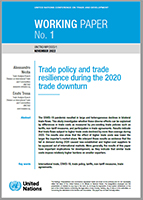
The COVID-19 pandemic resulted in large and heterogeneous declines in bilateral trade flows.
This study investigates whether these diverse effects can be explained by differences in trade costs as measured by pre-existing trade policies such as tariffs, non-tariff measures, and participation in trade agreements.
Results indicate that trade flows subject to higher trade costs declined by more than average during 2020.
The results also show that the effect of higher trade costs was lower the larger the importer’s market share.
We interpret these results as evidence that the fall in demand during 2020 caused less-established and higher-cost suppliers to be squeezed out of international markets.
More generally, the results of this paper have important implications for development, as they indicate that similar trade costs impose relatively higher burdens on smaller exporters.
The findings, interpretations and conclusions expressed in this document are those of the author(s) and do not necessarily reflect the views of the United Nations or its officials or Member States.
The designations employed and the presentation of material on any map in this work do not imply the expression of any opinion whatsoever on the part of the United Nations concerning the legal status of any country, territory, city, or area or of its authorities, or concerning the delimitation of its frontiers and boundaries.




